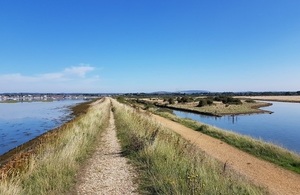Plans unveiled for coast path stretch in Hampshire and West Sussex
New proposals to improve public access to the coast path in Hampshire and West Sussex

Plans to improve public access to the coast as part of the England Coast Path have been unveiled today (3 October) by Natural England. The proposals cover a 48.5-mile stretch of coast between South Hayling in Hampshire and East Head in West Sussex.
Natural England aims to improve and link up existing access routes, to create a continuous signposted walking route around the estuary system of Chichester Harbour for the first time. This route completes the proposed England Coast Path route around Hayling Island, building upon the plans put forward for the west side of the Island as part of the Portsmouth to South Hayling stretch.
Chichester Harbour is a rich haven for wildlife, particularly for the common seal and a wide variety of bird species. The path provides walkers with great views of coastal wildlife, habitats and maritime pursuits, passing through remote and tranquil areas, in addition to some historic urban and rural communities.
The proposed route also invites walkers to use a ferry crossing between Bosham and Itchenor which provides a unique perspective of Chichester Harbour.
There is now a period of eight weeks for the public to have their say on the England Coast Path proposals. If approved, this route will become part of the England Coast Path – the 2,700 mile long distance walking route and England’s newest National Trail currently being developed around the entire English coast by Natural England.
Launching the plans, Andrew Smith, Natural England’s Area Manager for Hampshire, said:
We have had discussions with many landowners and key organisations along the proposed South Hayling to East Head route. Their input has been essential and helped shape the proposals, and we thank everyone for their time and input so far.
This special route promises to offer walkers a rich experience taking in coastal views, wildlife, and a patchwork of historic and rural landscapes. Over the next eight weeks, we are inviting all organisations, farmers, local residents, visitors and businesses to have their say. It’s important that all responses are taken into account and we look forward to hearing people’s views.
The plans include improvements to access, particularly along the Solent Way east of Emsworth. In this location Natural England has worked with local user groups and has set out proposals to improve the current bridge and walkway. This means that a route previously inundated by high tides could in future be available for use at all times.
This is the fifth stretch of the England Coast Path to be developed in Hampshire and third stretch of the England Coast Path to be developed in West Sussex.
Anyone can have their say about the report during the eight week period. Owners and occupiers of affected land can make objections about the report on specified grounds, which will be considered by a Planning Inspector before the Secretary of State makes a final decision.
All representations and objections must be received by Natural England no later than midnight on Thursday 28th of November. Copies of the reports can be viewed in local libraries. The full reports and all the forms and guidance on how to make a representation or objection within the next eight weeks are also available on the GOV.UK website
Additional information
The Marine and Coastal Access Act 2009 places a duty on the Secretary of State and Natural England to secure a long distance walking trail around the open coast of England, together with public access rights to a wider area of land along the way for people to enjoy.
Natural England is working on the entire coastal route, with new sections also opened in Cumbria, Norfolk, Dorset, Kent, Somerset, Yorkshire, Northumberland, North Tyneside, South Tyneside and Lincolnshire.
A map showing a timetable for the work is here.
- The England Coast Path will be our longest, newest and most challenging National Trail, passing through some of our finest countryside and coastal locations.
- It will secure legal rights of public access for the first time to typical coastal land including foreshore, beaches, dunes and cliffs.
As well as recommending new sections to the route, the proposals outline improvements to existing access to the coastline, with proposals:
- to identify a clear and continuous way-marked walking route along this part of the coast, bringing some sections of the existing coastal footpath closer to the sea and linking some places together for the first time;
- to allow the route to ‘roll back’ if the coastline erodes or slips, solving the long-standing difficulties of maintaining a continuous route along the coast;
About Natural England
Established in 2006, Natural England is the government’s independent adviser on the natural environment. Our work is focused on enhancing England’s wildlife and landscapes and maximising the benefits they bring to the public.
- We establish and care for England’s main wildlife and geological sites, ensuring that over 4,000 National Nature Reserves (NNRs) and Sites of Special Scientific Interest are looked after and improved.
- We work to ensure that England’s landscapes are effectively protected, designating England’s National Parks and Areas of Outstanding Natural Beauty, and advising widely on their conservation.
- We run Environmental Stewardship and other green farming schemes that deliver over £400 million a year to farmers and landowners, enabling them to enhance the natural environment across two thirds of England’s farmland.
- We fund, manage, and provide scientific expertise for hundreds of conservation projects each year, improving the prospects for thousands of England’s species and habitats.
- We promote access to the wider countryside, helping establish National Trails and coastal trails and ensuring that the public can enjoy and benefit from them. For more information, visit Natural England’s England Coast Path pages or twitter @NaturalEngland